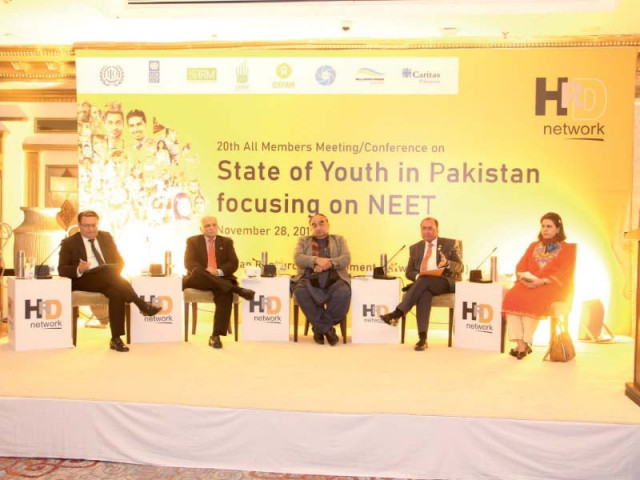Integrated youth development key to tackling unemployment, says Dar
SAPM on youth affairs stresses need for creating employment through private businesses
DNA
November 29, 2019
3 min read
Speakers express their views at Youth Not in Employment, Education or Training conference. PHOTO: EXPRESS
ISLAMABAD:
With a burgeoning youth bulge and rising unemployment, there is a need to focus on policies which promote integrated youth development. This was stressed by speakers during a conference on the State of Youth in Pakistan – focusing on Youth Not in Employment, Education or Training (NEET). The conference was part of the twentieth All Members Meeting of the Human Resource Development Network (HRDN) aimed at devising an outline for a future strategy to empower neglected youth through education and skills development initiatives. It was organised in collaboration with the United Nations Development Programme (UNDP), International Labour Organisation (ILO), Institute of Rural Management (IRM), Aga Khan Rural Support Programme (AKRSP) and Caritas Pakistan in the federal capital on Thursday. Special Assistant to Prime Minister on Youth Affairs Usman Dar said that the government has a five-point youth development and economic engagement programme as its top priority. “About Rs100 billion in loans will be disbursed to young people who have adequate plans to run businesses,” Dar said, adding, “We need to focus more on creating jobs through private businesses instead of relying on government jobs.” Moreover, he said that the Skills for All, National Internship Programme, and Green Movement initiatives will focus more on employing the youth after enhancing skills which are required for jobs on the ground, he said. The SAPM added that the government is working with the Higher Education Commission (HEC) in this regard to groom youth enrolled in higher education institutions with to equip them with the skill-sets required in the job market. ILO Country Representative Ingrid Christensen said that young women and men are disproportionately affected by unemployment and underemployment, poor quality jobs, labour market inequalities, difficult and long school-to-work transitions and skills mismatches. “Young people that are not in employment, education and Training (NEET) are particularly at risk of long-term disconnect from the labour market,” Christensen said, adding that NEET youth lack opportunities to develop their skills which further makes them prone to social exclusion and marginalisation over time and this develops a vicious cycle. Devcom-Pakistan Executive Director Munir Ahmed, while presenting policy recommendations, said that their foremost policy should be the implementation of existing policies in an integrated manner. The skills development programme should include guidance and mentoring sessions for youth. These sessions should be focused on helping the youth develop micro and small enterprises. For this purpose, Ahmed suggested engaging elected representatives at the Union Council level to collect on-ground data of the NEET youth apart from mapping needs for their effective education and training to enhance their skills as per their aptitude and interest. The Devcom-Pakistan chief further suggested engaging university students in on-job sort of training during the final two semesters of their Masters’ degree programmes to enhance their employability. “Pakistan is rich in a variety of crafts that can accommodate the major portion of the uneducated rural youth,” he said, adding that the urban youth can develop packaging and branding of the crafts to market it nationally and internationally. “There are many ways of stretching the job market to adjust the NEET youth.” AKRSP General Manager Muzaffaruddin mentioned how his organisation has engaged rural and urban youth in many small and medium enterprises. To achieve the employment targets, he said that guidance and mentoring is key to enhancing the employability of youth. “Market-based skills help youth getting engaged in the economic cycle,” he suggested. The speakers were of the view that 62 per cent of the population needs to be activated for productive economic output. Talking about the scope of the conference and the AMM, the HRDN Chairman Room Hayat said youth is a powerful force for transformational change. With their demographic size and more importantly their fresh ideas and energy, the youth can lead the way to sustainable human development if provided with a conducive environment. HRDN CEO Robeela Bangash said that the skills gained from education and employment enable engagement, but this does not mean that uneducated and unemployed youth cannot be empowered or engaged. In a society where the young outnumber the old, youth potential would be dangerously simplistic and pessimistically self-defeating. The share of youth not in education, employment or training is also known as "the NEET rate" that provides a measure of youth outside the educational system, not in training and not in employment. Other speakers included Majyd Aziz, President Employers federation, Zahoor Awan, General Secretary Pakistan Workers Federation, Shahid Naeem, Head of SDG unit Planning Commission of Pakistan, Published in The Express Tribune, November 29th, 2019.




















COMMENTS
Comments are moderated and generally will be posted if they are on-topic and not abusive.
For more information, please see our Comments FAQ